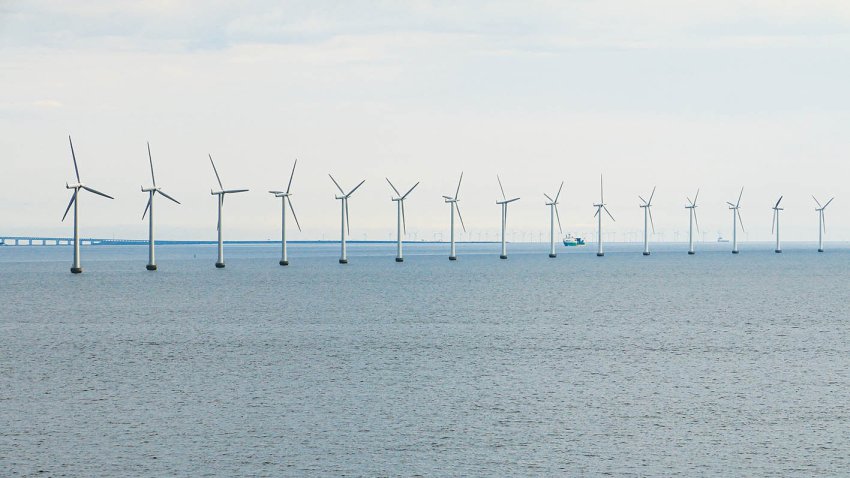
Together with the Australian Manufacturing Workers Union (AMWU), the Electrical Trades Union (ETU), the Gippsland Trades and Labour Council and the Victorian Trades Hall Council, the Maritime Union of Australia (MUA) Victorian branch wants the federal government to support a private bid to develop Australia’s biggest offshore wind power project off Gippsland, in Victoria.
MUA Victoria deputy branch secretary David Ball told Green Left Weekly: “We’re pressing on with an important project – something the government should have been doing”.
The MUA wants the government to green light the project and is campaigning to make it “the best possible example of a just transition”.
It also wants help establishing an offshore wind industry as part of ensuring it members on oil and gas rigs — a “twilight industry” as Bell describes it — get secure and well-paid jobs in the renewable energy sector. MUA members who currently work on oil and rigs would not need retraining as they already have the skills required for a wind turbine farm, Ball said.
Ball said the union is still negotiating with the company, The Star of the South, as it wants to ensure decent pay and a “really good roster”.
“The bottom line for the MUA is that we want to negotiate what’s known as the ‘Norwegian roster’ — 3 weeks on, 3 weeks off, 3 weeks on and 6 weeks off. This is because we are concerned about the mental wellbeing of our members and their families living in the fly-in fly-out schedule. It is also about creating more employment.
“While there would be a proportional drop in pay, it would still be good. And there will be more jobs created this way.”
The MUA is also committed to ensuring jobs will be offered to the Gunaikurnai people of south-east Australia, where the project is sited, and would actively seek women to take up jobs in the project.
Example
Ball said: “My understanding is that if this was to get up and running, there would be several other projects across Australia that could be started up relatively quickly.
“One is close to the same level as this one, but everyone is waiting to see what the federal government’s response to this one is.
“The others don’t want to start up and then hit a brick wall.”
The unions are also pushing for an independent regulatory authority to have the final say over such projects. “The National Offshore Petroleum Safety and Environmental Authority — the current body — is not up to the task,” Ball said.
He believes that while the “just transitions” language might sound strange to many members, coming up with practical solutions to the climate emergency is not. “It’s just common sense for most people”, he said. “It is bewildering to them that the government is not doing anything about it.”
Ball said the MUA is happy other unions are involved. The AMWU is hoping such projects will boost manufacturing, while members of the ETU, which covers energy sector workers, will benefit from long-lasting and secure jobs. The servicing and maintenance of wind turbines is also very “jobs rich”, another reason why the wind farm project is so important.
“It will bring energy jobs for 30 years”, Ball said.
Government
The MUA is concerned the current haphazard and slow shift to renewable energy is relying on outdated regulations that do not adequately provide for workers in the new offshore renewable industries. It wants governments to step up.
In a submission to the NSW Committee on Environment and Planning in October, the MUA said: “Given the urgency of emissions reduction, the complexity of developing an offshore wind industry in Commonwealth waters, and the challenges caused for the electricity grid with the closure of power stations, we believe the Commonwealth government should play a direct role in developing offshore wind.”
The MUA also said that, as long as the transition to sustainable energy remains “largely unplanned”, climate denial parties, among others, could exploit coal mining communities’ legitimate fear of losing jobs and livelihoods, as happened in the Hunter Valley in this year’s federal election.
Another problem the MUA noted is that jobs in the private renewable energy sector are often poorly paid and insecure.
It urged governments to play more of a role in supporting community-initiated projects, such as the Port Augusta solar thermal plant.
The submission notes privatisation and the marketisation of the National Electricity Market have added “significant obstacles” to renewable energy transition. It therefore stated the most efficient and jobs-rich way forward would involve the “overhaul of the electricity system to be run in the public interest”.
The submission said: “Our electricity network was built around large-scale centralised generation sources which then transmit that energy long distances to electricity consumers.
“A renewable energy system has to function very differently, requiring decentralised and interconnected grids with significant flexibility to manage constantly changing flows of energy.
“This will require a massive transformation of Australia’s electricity network, a task that a fragmented private or corporatised sector will not deliver.”
It concluded that the market cannot, and is not, leading the emissions reduction that is needed.
In the meantime, the MUA will continue to support individual projects that show, at a small scale, what could be done on a national level if the political will existed.